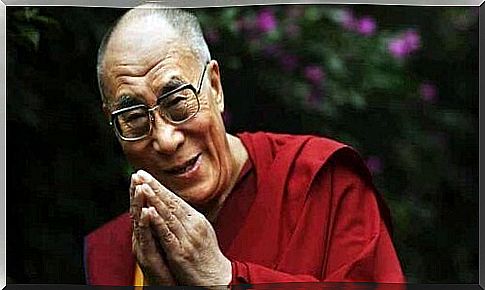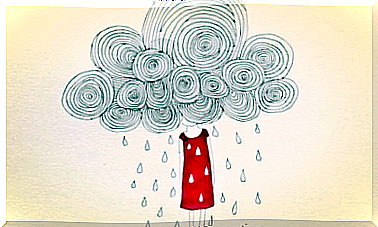Destructive Emotions According To Daniel Goleman

One of Daniel Goleman’s most interesting books is Destructive Emotions . In it, he explains that when the Dalai Lama met him with a small group of scientists and philosophers at the top of the Mind Life Institute , the world was about to change. A few months later, the September 11 attacks took place.
This book is the result of all the conversations with the spiritual leader, but also of what happened afterwards. Why is human being capable of committing violent acts?
This is the question they asked themselves during this historic meeting. Why are apparently intelligent and rational people capable of destructive behavior?
Psychologists, psychiatrists, sociologists and any analyst of human behavior would no doubt speak of education, context and personality. They would also talk about social factors and even genetic and brain aspects.
The Dalai Lama has approached him with an aspect on which Daniel Goleman particularly agrees. He spoke of destructive emotions, those emotions often governed by simple impulses and which reveal the worst in ourselves.
While from psychology we can understand these realities as “negative emotions”, Buddhism calls them kleshas or impurities. It is these disruptive elements that plague the mind.

What are these destructive emotions that Daniel Goleman talks about?
The first question that may come to mind when first discussing this topic is: are there really destructive emotions? From the point of view of emotional psychology, there are no negative emotions.
The entire spectrum of our emotions serves a purpose. Therefore, it is not entirely correct to assume that there are good and bad emotions. Fear, for example, guarantees survival; sadness promotes a period of introspection to accept certain realities and change others.
These unpleasant states that are difficult for humans to assume are of paramount importance in our behavior and also in our survival. So… What was Daniel Goleman’s goal when he wrote Destructive Emotions ?
Let’s clarify one aspect. This book by the bestselling author in the field of emotional intelligence has been framed in spiritual practice, more specifically, from the perspective of the Dalai Lama.
For this reason, Goleman differentiates the Western view of emotions and this more philosophical and less scientific view of Buddhism which still offers us a precious framework for thinking. During these talks with the Lama in 2001, many of the most rigorous minds in the West surrendered to the Tibetan leader’s approach.
Unwanted emotions affect our words and actions
Buddhist philosophy reveals that the most common sources of suffering and unhappiness are embedded in a series of negative emotions that plunge us into nihilism, ignorance and materialism. These are, according to the Dalai Lama, mental states that distort our inner dialogue and the way we communicate with others.
What are these negative emotions, according to Buddhism? They are the following:
- Hatred.
- Anger
- Frustration
- Anxiety.
- Jealousy.
- Desire.
- Desire understood as attachment.

From a scientific point of view, it should be noted that the Dalai Lama is not wrong. There are indeed destructive emotions in the most literal sense of the term. This is particularly the case with anger and anxiety.
According to a study at the University of Sydne, the risk of having a heart attack is 8.5 times higher within two hours of experiencing intense and excessive anger. This is a point that we must take into account.
The kleshas , the poisons of the spirit and the four antidotes
The curiosity of the world of psychology towards Buddhism and its philosophy is not new. The dialogue between Buddhism and Western sciences began in the 1960s.
Works like those of Erich Fromm and Carl Gustav Jung began this path which later culminated in the Dalai Lama’s encounters with such figures as Daniel Goleman, Paul Ekman, Richard J. Davidson and Matthieu Ricard, etc. The concepts of evil, suffering and happiness have always been discussed.
For Buddhism, there are “antidotes” to counter the kleshas , those destructive emotions that poison our minds. These antidotes are:
- Love ( maitri; byams pa ).
- Compassion ( karuna; snying rje ).
- Empathic joy ( mudita; dga’ba ).
- Humility ( upeksha; btang snyom ).
The benefits of meditation according to Daniel Goleman
For Buddhist philosophy, meditation trains the mind to achieve a state of calm, better balance and a better appreciation of the present moment. Studies like the one conducted by Dr. Richard Davidson of the University of Wisconsin-Madison have demonstrated the great benefits of this practice.

Dr. Davidson’s work spanned more than three decades. The latter showed how meditation promotes neuroplasticity and generates very positive changes in our brain.
This practice reduces stress and improves attention, creativity, management of emotions… So much so that Daniel Goleman himself did not hesitate to devote more than one book to this subject.
In short, destructive emotions are fundamentally internal states that limit our potential and which can also bring out the worst in ourselves. Buddhism and modern psychology agree on one point: it is in our power to control these impulses and we have the resources to do so.









